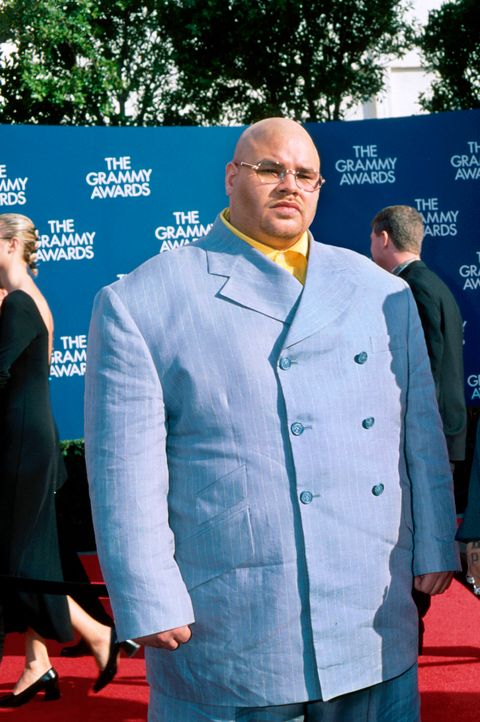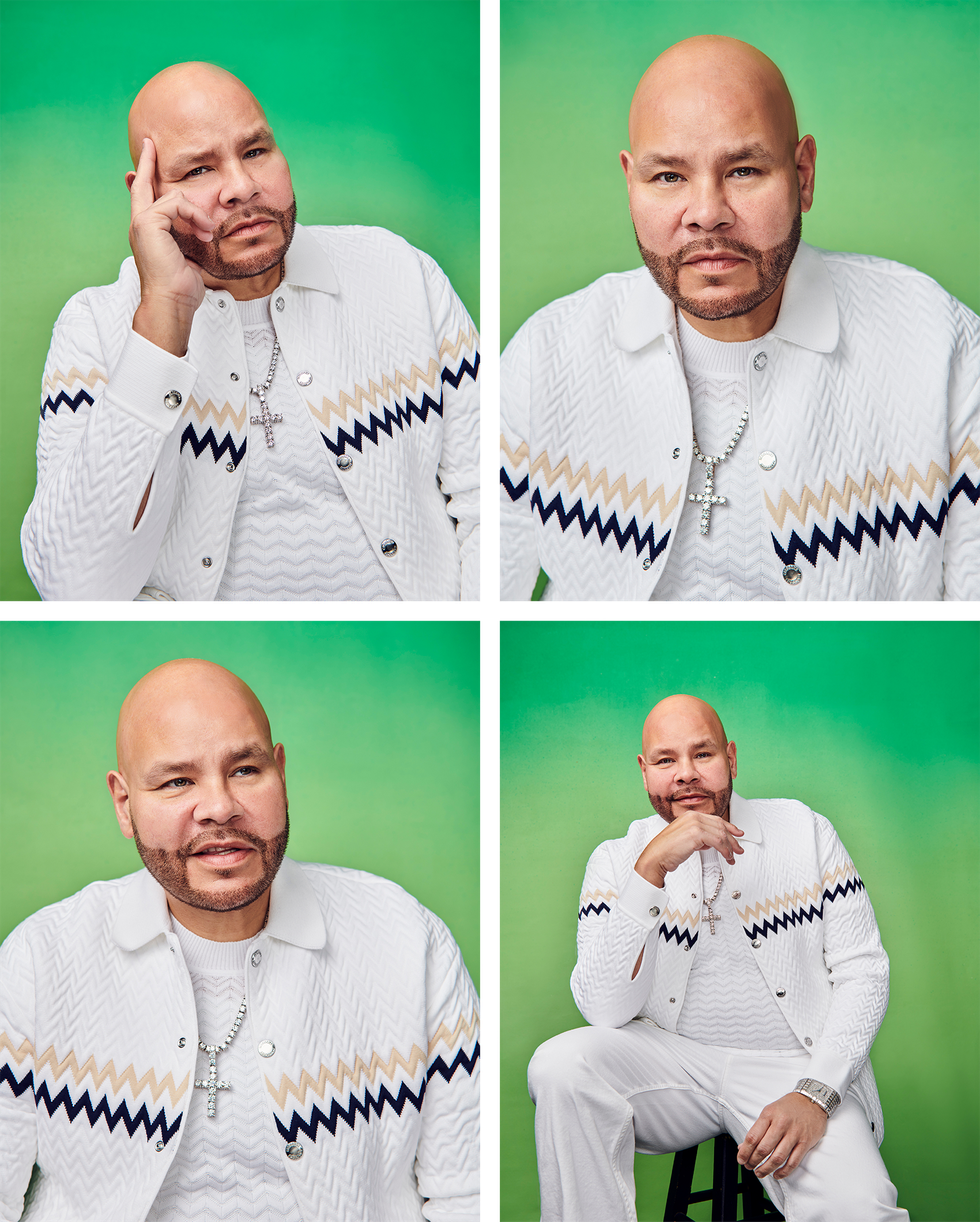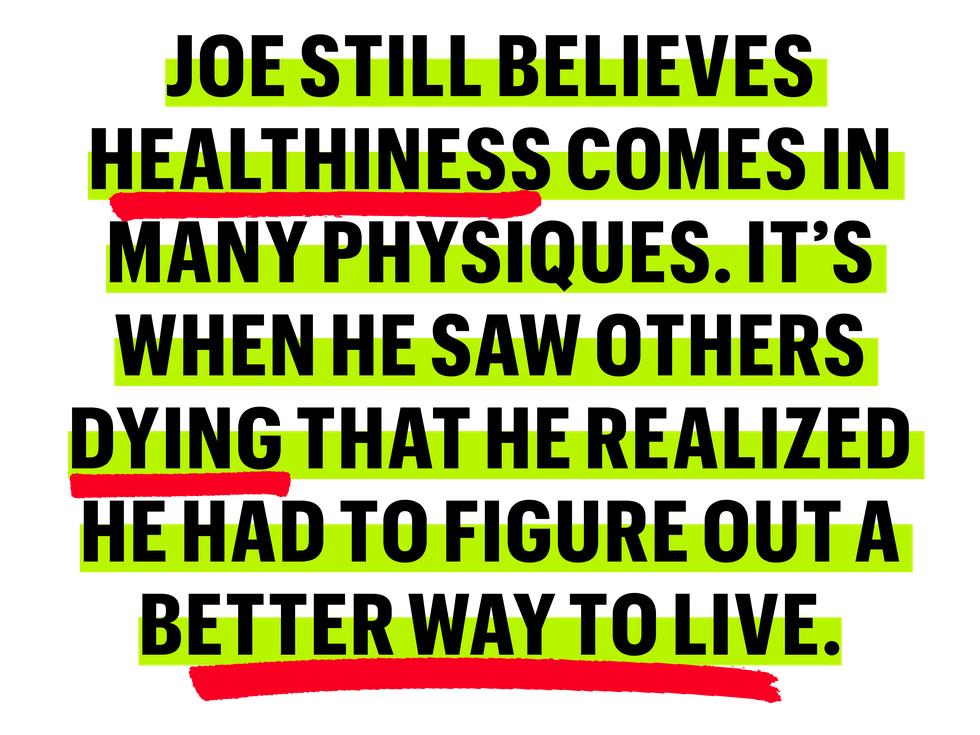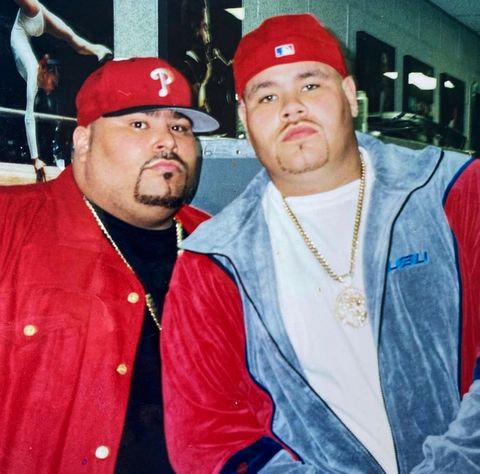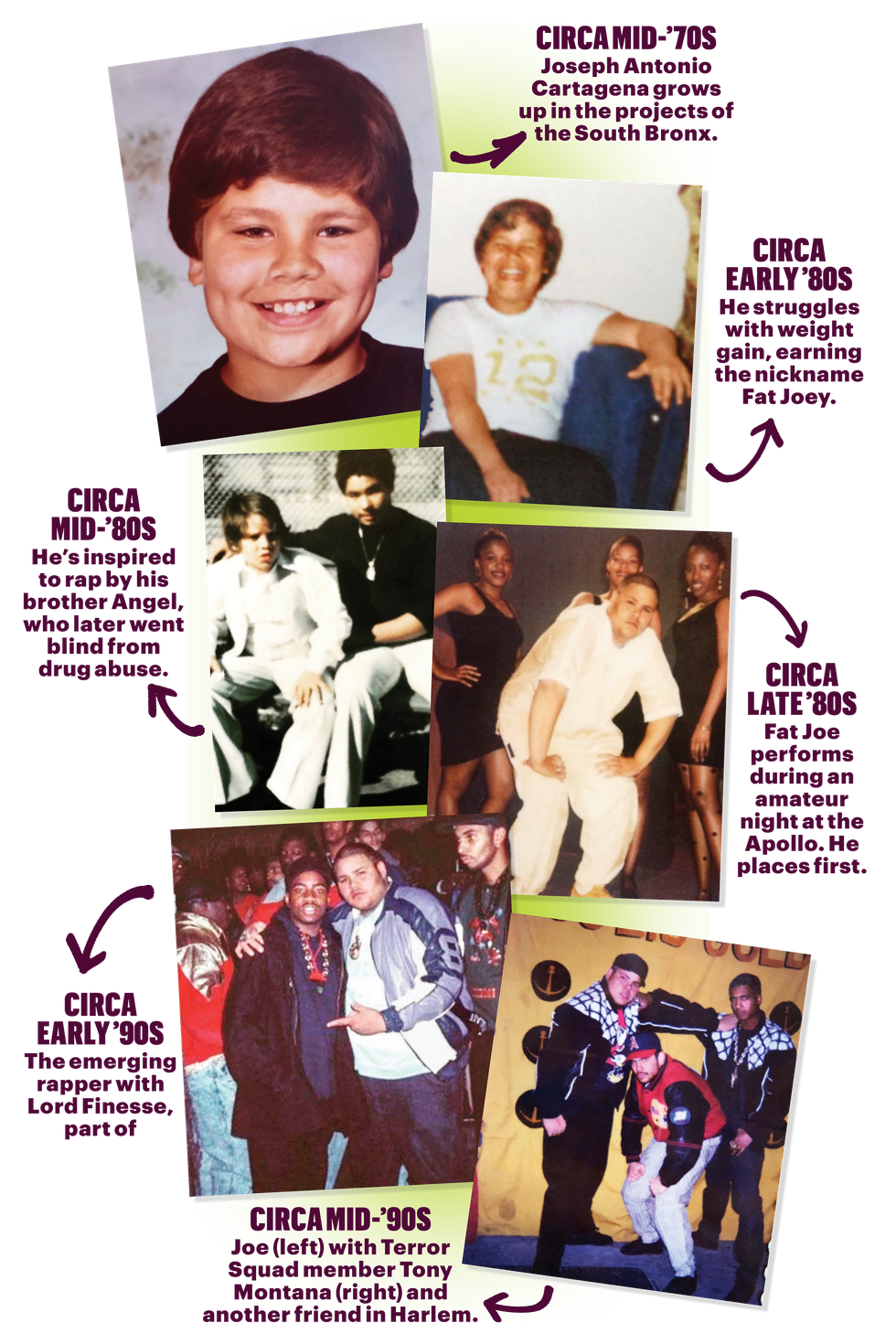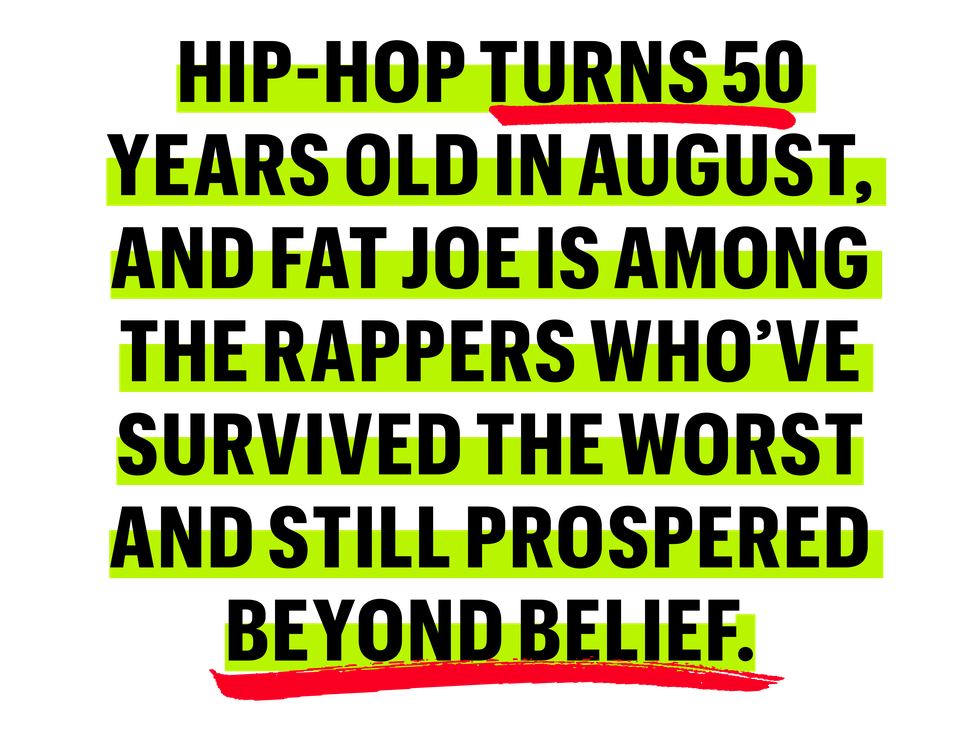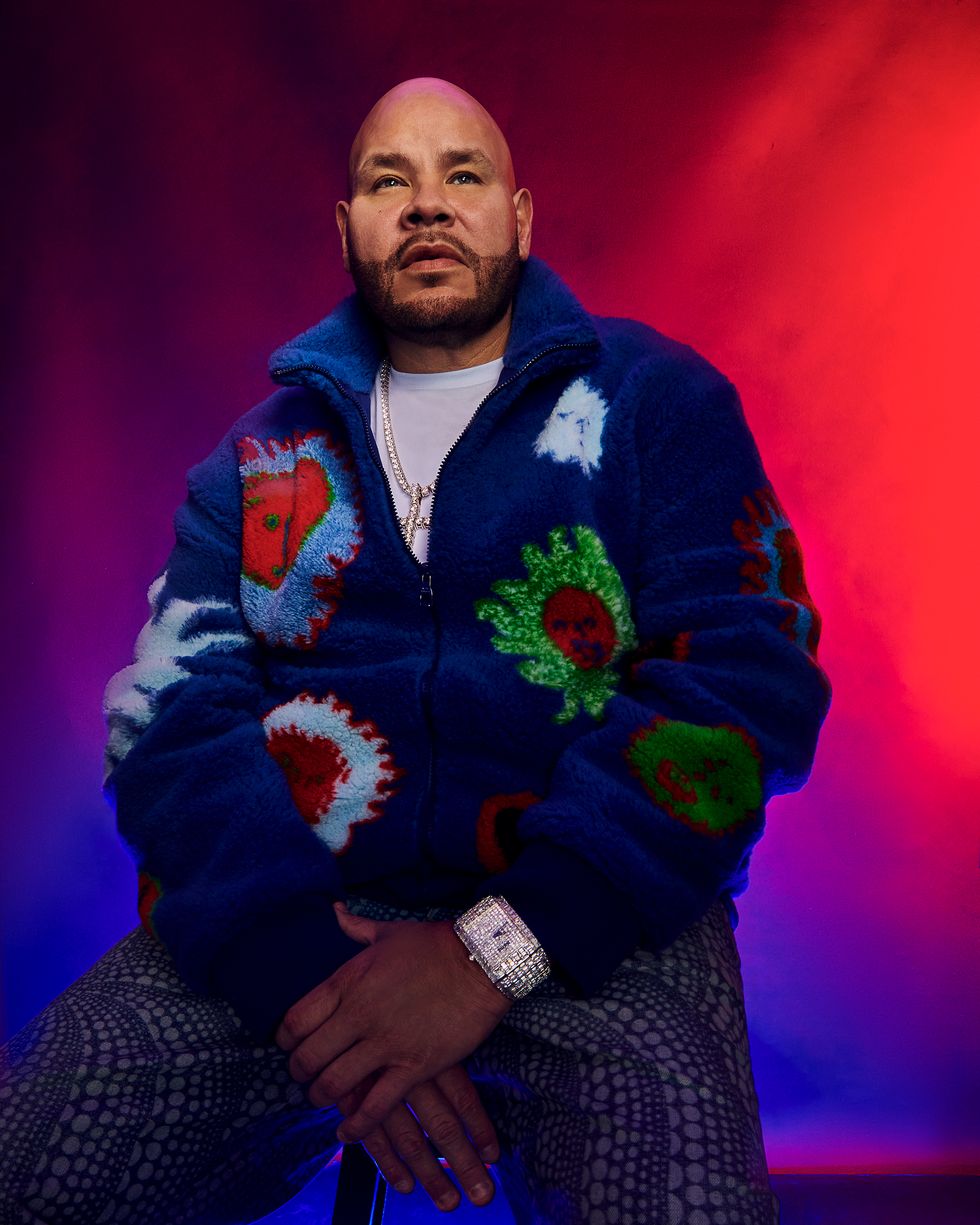[ad_1]
“LET ME TELL you something,” Fat Joe begins, the first sign that he’s entering story time. The rapper turned media maven, author, and world-class narrator, born Joseph Antonio Cartagena, will do anything to make a small tale seem taller, especially if it means amplifying his volume as he builds toward a bigger point. “My uncle Fello,” he tells the room, “died at 93 years old.”
It’s a bright spring afternoon, and Joe is treating a cavernous Manhattan photo studio as if it’s his private barbershop, bantering in his thick Bronx drawl as he beholds one of the many prized treasures of his sneaker collection: a pair of royal-blue Jordan 4 Retro Florida Gator PEs (player exclusives) that runs as high as $8,300 but that he scored from a Fat Joe fan at a discount of $4,000. “Do you know what he was doing the night before? Building his sneaker closet,” Joe says of his uncle, laughing. “He had fresh kicks on!” Joe reiterates: “90-something years old.”
What could have been a brief aside about a relative’s love of footwear becomes an epic retelling in Fat Joe’s world. The fans who’ve listened to his decades of chart-topping hits, or recently cued up his Instagram Live for one of the regular fireside chats that have earned him the pithy nickname Joprah, all know this trademark vibe. He’s great at adding just the right amount of gravity or incredulity to his narratives, dazzling listeners with the finest minutiae.
“For a 90-something-year-old still caring about his sneakers?” Joe says, shaking his head. “Fello still had ’em.” Joe refers to his own home closet as a museum stuffed with “wearable art.” He wants to live long enough to be as literally fresh to death as his uncle Fello was. But soon he’s off on another tangent. “You know what I did the other day?”
Fat Joe loves to joyously reminisce because he knows how many times he could have flamed out over the years—or worse—but has been saved. He’s more than willing to share just how close to death he’s come and how he had to battle hard to win back his physical and mental health. The Book of Jose, the memoir he published last November, is a sobering portrait of survival, which, for Joe, now means being much more mindful about how he lives. At one point, he tipped the scales at 470 pounds. He’s lost about 215 of that over the past 15 years, first in a giant whoosh and then through more sustained progress, making practical lifestyle tweaks while learning the science of food.
These days, the hip-hop stalwart, who once celebrated his undeniable presence with a chorus that consisted mostly of “I’m livin’ Fat, y’all. I’m livin’ Fat,” is equally unapologetic about his inclination to substitute zucchini for spaghetti and about his favorite: sweet-potato mash topped with Splenda and I Can’t Believe It’s Not Butter. There is no set fitness goal. Joe just wants to stay alive, and he’s altered his daily habits to fit this mindset, transforming his body by focusing on improving his net happiness with more than superficial gains.
Part of that means continuing to tell stories in ways that excite him and help him understand himself better, too. Maybe you’ve seen him guest cohosting The Wendy Williams Show or The Drew Barrymore Show. He’s also developing a Starz talk show—executive-produced by Sean “Diddy” Combs and LeBron James’s SpringHill Company—and a one-man show in the style of Mike Tyson or John Leguizamo that Joe promises will be fun, funny, sad, and emotional. “I want you to be able to see it, smell it,” he says.
At 52, Fat Joe is entering a new prime of his life while being poised to become an even larger household name. But what about that name? He’s made millions off it and inspired confidence in others even as he’s rebuilt himself physically and emotionally. Whenever he’s debated a new alias, though, he’s reminded himself that Fat Joe is an entity and a source of pride. His name is his name. “Although I’ve gotten health conscious on another level,” he says, “it wouldn’t make sense to change it. Now it’s my brand. It’s what I built.”
HE WAS ALWAYS Fat Joey, born in the South Bronx in 1970, three years before the emergence of hip-hop. His mother Ruby’s family is from Puerto Rico, and Joe’s father, Ernesto, moved from Cuba. They met in the Bronx and had Joe, the youngest of his mom’s four kids. Surrounded by the neighborhood’s funniest, shadiest, most tragic characters, a young Fat Joe would sit in front of his building in the Forest Houses projects and play Snaps, cracking jokes with his crew until five in the morning. In The Book of Jose, Joe describes a life of hustling and dealing, getting beat up and bullied in school, and being shot, nearly dying. He saw family and friends die in spades and watched his brother go blind as a result of his addiction to drugs.
“I grew up in the Bronx. South Bronx. The buildings is rusty. Decay. Piss in the elevators. I’m not glorifying it,” says Joe. “I grew up in this environment, and over the years, I’ve accumulated a skill set that I could put you somewhere. I got friends doing life in prison, and I used to always do my albums thinking about them stuck in a cell. They have no TV, but they got Fat Joe’s album. I wanted them to hear and visualize what was going on. And to me, telling a story is way easier than rhyming words, making hooks, and flipping flows. Telling a story is like, you captivate the audience.”
As hip-hop exploded from its genesis at DJ Kool Herc’s party on August 11, 1973, Fat Joe got into trouble and escaped it through rapping. He was a teenage graffiti writer, witnessing historic hip-hop firsts at jams in the Bronx’s most popular stomping grounds. In 1992, in his 20s, Joe became a founding member of the reputable Diggin’ in the Crates crew (D.I.T.C.) alongside local legends like Lord Finesse and Harlem’s Big L.
In 1993, he was 23 and riding the wave of his debut solo album, Represent, and that’s when he saw Christopher Rios, aka Big Pun, freestyling outside a Bronx bodega. Pun asked if he could rap for Joe, and they had a lot in common: two big guys and vivid storytellers. Joe recruited Pun for his Terror Squad crew, creating immersive grimy tunes and unruly anthems with him while breaking barriers for Latin artists and retrofitting his style to match the sound of the times. I t’s why every decade in hip-hop since the ’90s has featured a Fat Joe hit, from the Ashanti-assisted “What’s Luv?” to instructional club staples like “Make It Rain” and “Lean Back,” both released in the mid-2000s, when Joe started to lose his first 100 pounds.
Joe still believes healthiness comes in many physiques. It’s when he saw others dying that he realized he had to figure out a better way to live. In February 2000, Big Pun, his best friend and mentee, died unexpectedly at 28, weighing nearly 700 pounds. He’d also struggled with a heart condition. Joe subsequently lost six more friends to heart attacks, including another who died in his 20s. “I went to his funeral and I felt like Ebenezer Scrooge,” Joe says, now settled into an armchair in a conference room after the photo shoot. “Like, I seen me. And I’m looking at his little daughter. She was the same age as my daughter. I said, ‘You gotta lose weight; otherwise you outta here.’ ”
After Big Pun died, Joe started to spiral. He lost his grandfather and sister, who fell into a coma after an epidural while giving birth in 2000, and he entered a period of depression that saw him excessively drinking and gaining weight. He’s explained it to friends, fans, and daytime-TV hosts as feeling as though his mind was a Rubik’s Cube. “The most complex Rubik’s Cube you could ever, ever, ever, ever try to figure out,” he says. “And so you battling that every day.”
Today, with the sunset providing a scenic backdrop outside the window behind him, he compares his feelings at the time to a scene in a movie he watched on a plane the day before we met—The Matrix Resurrections, in which Keanu Reeves, as Neo, sits in the bathtub with a rubber duck on his head, stoic.
“That’s what depression was like to me,” Joe says. “When you’re fighting yourself, there isn’t a wall high enough that you can build. There isn’t an island you can go to. There isn’t a place you can go to where you get away from it, because you’re fighting your mind. You wake up, and then the minute you think about it, your brain sends you a message to say, ‘We’re not supposed to be happy.’ And then you fall right back into depression.”
Interviews made it worse. “Imagine me and Big Pun all over TV. We’re together. We’re best friends. Making hit records together. He dies, and everybody in the world keeps coming up to me: ‘Sorry for your loss,’ ” Joe explains, “not knowing that they’re triggering the depression every single time. There was no way to go in the world. And so when I see pictures of my sister, I try to breeze through them. I lost a lot of people, and unfortunately I can’t sit there and dwell, because I know that’s something that takes me down that path. So I gotta push forward.”
He stresses that with his memoir, he wanted to be transparent about his struggles. “My life is a Pandora’s box of different traumatic moments. But I wanted you to get that,” he says. “I wanted you to say, ‘Wow, all this time, I didn’t know they was trying to put this man in jail. This whole time, his brother went blind from drugs, and he’s still smiling at us. He’s still saying, Yesterday’s price is not today’s price. They robbed him blind till he ain’t have a dollar.’ I wanted people to know that you could keep a smile on your face.”
It took two years for Joe to crawl out of that state, and when he did (more of a gradual revelation than an aha moment), he started shifting his habits. “Once you snap out of it, you should know what brings you there and to run the other way,” he says. “The minute I feel unhappy, I go toward happy.”
For him, happiness is a combination of things big and small. “I have a huge house, right? It’s beautiful. Got everything somebody could want,” says Joe. “But when I pull up to my mother’s home that I bought for her that’s a modest home, it puts the biggest smile on my face. And when I go inside, she’s happy and my father’s happy and everybody’s happy. I never told my daughter ‘no’ one time in her life for anything. It’s always been ‘yes.’ That makes me happy. I’m a big movie guy. John Wick 4. Air. That makes me happy. CNN makes me happy. When you’re on the road so much, you feel so happy to sleep in your bed.”
In his first attempt to get fit, around 2002, Joe tried everything outside of surgery, from running on treadmills in a plastic suit to dietary changes that didn’t work. He found better success when he started understanding the science of good habits. “Your body’s just a computer. It reads stuff you eat in different ways,” he says.
Diagnosed with diabetes around age 12, Joe never picked up healthy eating habits at home. “My parents, thank God they’re still here, it’s the biggest blessing, but they still cook in lard,” he says. “They still drink the milk with the red cap!” By 2011, Joe was celebrating his physical transformation and sharing it with fans on “Drop a Body,” whose title is a canny reference to both his lyrical skills and his dramatic weight loss. The jokes commenced about him looking like “Slim Joe” in the music video, at which point Joe briefly considered whether the moniker he embraced for so long still fit. He reevaluates it now and again. (“Maybe I’ll change my Instagram for a month and call myself Slim Joe,” he tells me.) But it’s not something he grapples with for too long.
Once he started losing weight, he stopped needing to take insulin and found it easier to find clothes in his size. Joe’s longtime friend and collaborator Remy Ma remembers when he would buy two or three of the same outfits at the Gucci store and have a tailor stitch them together to fit. “Now to see him be super fly like he’s always been and get his size out the store,” says Remy, “that says a lot.”
AS FAT JOE transformed himself, the world outside changed. Fat has become an empowering term for a generation that has embraced acceptance of all sizes. Fat Joe gets that he played a role in disarming the word fat by reclaiming and fully owning it whenever he shouted his name in a song or appeared shirtless during stage performances and music videos. He compares his body-positive stance in the 2000s to that of Lizzo now, whose approach is more intentional. “She’s embracing her beauty, saying, ‘I’m a big girl and I’m proud of it. All you big girls could rock out with me,’ ” Joe acknowledges. “I used to do that, too.”
Still, he feels undeserving of recognition for his fit evolution, because he isn’t some jacked poster boy or sculpted superhero. “I’ma be honest with you: I avoided this interview for a long time,” Joe says. “Although what I did is pretty cool for me, there’s people who take it even more serious.”
But there are millions of hip-hop fans, Fat Joe followers, and friends who see Fat Joe as the Average or Realistic Joe who stays fit in a way that works for him. He’s all about a healthy balance, which starts with being honest and comfortable with himself and adjusting expectations as he ages. “Everybody’s body is custom-made. I don’t think Fat Joe was ever meant to be brolic. I can be strong as hell but not cock-diesel,” he says. Instead, he’s learned to value the inner strength he discovered along his fitness journey as well.
This content is imported from youTube. You may be able to find the same content in another format, or you may be able to find more information, at their web site.
Fat Joe’s had hit songs in every decade since the ’90s, including 2002’s “What’s Luv?” featuring Ashanti.
This year marks the 30th anniversary of Represent, which put Fat Joe and his moniker on the map. Hip-hop turns 50 years old in August, and Joe is among the rappers who’ve survived the worst—bullying, violence, jail, health scares, and immense loss—and still prospered beyond belief. With hip-hop now in middle age, many of the culture’s veterans are Black and brown men in their 40s, 50s, and 60s who’ve seen peers taken out by drug addictions or violence and dying far too young. It makes them reckon with mortality differently and work to figure out the best ways to not only stay in shape but also prioritize their mental well-being.
His inner circle has adapted accordingly. “Joe’s kept off his weight for almost ten years now. It didn’t happen overnight,” says his manager Rich Player, who’s been friends with Joe since they were 17. “He’s kept up this lifestyle because he wants to live. He wants to keep flourishing in life. He wants to keep providing for his family.” When Joe was sick with Covid, Remy Ma made him gift bags full of sugar-free snacks. Her daughter (Joe’s goddaughter) got the memo, too: “We go in the store, and she’s like, ‘Let’s get Pop-Pop cupcakes! It’s the sugar-free ones!’ ”
Joe never wanted working out to feel like a job (and doesn’t like to be told what to do), so instead of hiring a trainer, he incorporates fitness into his daily activities, like biking around Miami and hitting the elliptical. (Rich Player calls him the “elliptical king.”) Joe advocates taking baby steps. “Everybody is different, because I got some friends that love the gym, and these guys spend hours lifting weights,” he says. “And they the ones that got the back problems! You gotta do whatever keeps you healthy. You start off exercising ten minutes a day, doing some cardio. Then 15 minutes. Then 20. And before you know it, you’re at 45, an hour. It’s a gradual thing.”
“He really sticks to it,” says Remy. “We party a lot. We socialize a lot, and there’ll be some good-ass food. And I’ve seen him maintain his restraint, like, I’m chilling right now. When he has events, he hires a chef that makes two different things. He’s found ways to compensate, and he’s very much active. A lot of times, people get to a point where they’re like, All right, I’ve been doing this long enough. And he just hasn’t. Instead of a thing that he had to do, it turned into a lifestyle.”
Joe is adamant about checking his blood pressure, cholesterol, and blood-sugar levels every three months. “It gets really, really scary when you think you’re doing everything right and your numbers are higher than you want,” he says. “I could do the same thing now that I did ten years ago, and now my numbers are a bit higher because I’m older, and my metabolism and body are getting older. So you gotta try new ways to figure out how to keep your stuff under control.”
Everything Fat Joe does revolves around his desire to stick around. He feels indebted to the universe for his survival and wants to pay it forward. It’s what fuels his candidness, intimacy, and mini TED Talks on Instagram Live, and it informs his future talk-show ventures, all under the name Fat Joe.
He recalls a conversation with one of his drivers, Steve (“Great driver,” Joe says), who reminded Joe of his cultural impact. “Steve is a big boy,” Joe starts. “And he said, ‘Man, you always fly, Joe. All the big boys, you gave us confidence and made us think that big was fly. You Fat Joe. Then out of nowhere, you start losing weight.’ I said, ‘Man, I thought you guys would be happy for me! Because I’m getting healthier.’ And he said, ‘Nah, man, we feel like you left us. For years, you’ve been telling us being a fat guy is cool. We got upset with you, the big boys.’ ”
Joe recalls the confusion he felt, mixed with pride. “Here I was, giving confidence to oversized people, and they felt like I flat left them,” he says with a chuckle. “They didn’t realize I was just thinking about, yo, I really wanna be here for a long time. I really want to work out. I really want to be healthy. I wanna be here.” He’s still Fat Joe. The moniker just stands for even more now.
Clover Hope is a Brooklyn-based writer and the author of The Motherlode: 100+ Women Who Made Hip-Hop.
[ad_2]

